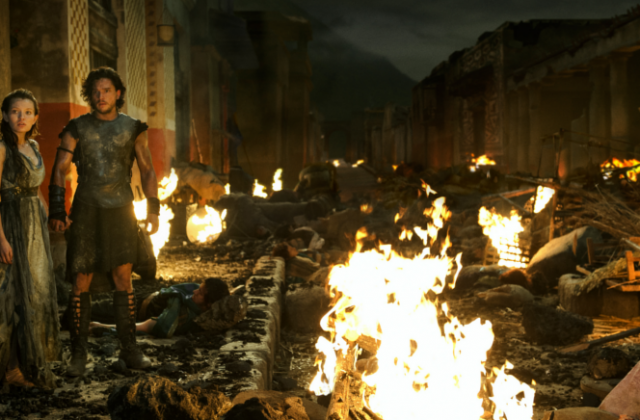‘Pompeii’ Echoes Not In Eternity
Kai Sacco of Film with Kai Sacco reviews Paul W.S. Anderson’s disaster Pompeii.
POMPEII
★★ out of ★★★★
By Kai Sacco | February 21, 2014
The old saying goes, ‘You don’t know what you’ve got till it’s gone,’ or in the case of Paul W.S. Anderson’s half-baked, volcanic actioner, Pompeii, you don’t know how well something worked until a wholly unimpressive version of it rears its ugly head. Areas of the three films Pompeii rips shine brighter when posited against it: the alarming sense of dread and menace permeating every frame of Dante’s Peak, another disaster flick where a town-city is threatened by a local volcano; the finely tuned romantics ofTitanic, another tragedy where a lower class man and higher class woman’s forbidden love is doomed by an unforeseen force; and the expertly crafted revenges of Gladiator, another drama where a slave-turned-gladiator comes face-to-face with the persons that slaughtered his family.
Pompeii desperately wants to be all of those movies but doesn’t have the craftsmanship behind the camera or wit on the paper needed to achieve that. It’s so excited to blow stuff up in the third act with cartoonish special effects that the first hour and 10 minutes is a rush job of mildly entertaining gladiator battles, hokey politics, dialogue that was written on a napkin (presumably via crayon) and a love story so underdeveloped and nonexistent that even a pyroclastic flow isn’t powerful enough to scorch its mediocrity.
Anderson (Mortal Kombat, Resident Evil) begins the story where Gladiator was patient enough to wait on till the end of the first act to show, and that’s the slaughtering of the protagonist’s family—here, his entire tribe as well—by Roman guards. Milo (Kit Harington, Game of Thrones) is a young boy during this and miraculously survives the mass extermination. But he’s eventually captured and enslaved. Fast-forward some years later and he’s now a gladiator of towering threat.
The film spends over an hour in the arena, while giving us a barely passable love story that consists of long gazes from the distance between Milo and Cassia (Emily Browning), the daughter of a wealthy merchant, and foreboding crane shots from Pompeii to Mount Vesuvius, reminding us that, yes, there is a volcano and it will blow the hell up. Throw a terrible Kiefer Sutherland into the mix as the evil Senator Corvis—who, obviously, is all mad that Cassia doesn’t dig him, and, who is responsible for offing Milo’s people—and you have yourself one mess of a movie.
Pompeii wants to be a disaster flick but does a terrible job projecting the bone-chilling fright that should come with impending disaster. Dante’s Peak succeeded in this area because it displayed patient direction and unsettling silence during its moments of terror.
Pompeii wants to be a drama about an individual who exacts his revenge on those that wronged him but treats Milo’s plight as a mere establisher of story instead of examining the pain behind it. Gladiator succeeded in this area because it cared enough to build a relationship between Maximus and you, the audience, before throwing his whole world into a tailspin. You felt his agony and more importantly, you felt for him.
Pompeii wants to be a tragic story about the death of new love but spends only a modicum of time developing a relationship with its leads, sidelining them for most of the film until the third act reminds itself that they exist. Titanic succeeded in this area because it took the time to create memorable moments between its two protagonists, so that when their eventual separation came about, it hit you like a ton of bricks.
James Cameron understood that any accomplished love story shows that the enchanted person(s) have learned something about themselves or life through their romantic entanglement. In his film, it took a kindhearted, nomadic artist with nothing to lose and everything to gain to show an emotionally imprisoned first class girl how to once again be excited for life and realize that she must break free from the shackles of her loveless marriage in order to do that. In Pompeii, realizations of any kind are never met.
Cast & Crew
Kit Harington as Milo
Carrie-Anne Moss as Aurelia
Emily Browning as Cassia
Adewale Akinnuoye-Agbaje as Atticus
Jessica Lucas as Ariadne
Jared Harris as Severus
Joe Pingue as Graecus
Kiefer Sutherland as Corvus
Currie Graham as Bellator
Directed by Paul W.S. Anderson
Screenplay by Janet Scott Batchler, Lee Batchler and Michael Robert Johnson
Produced by Paul W.S. Anderson, Jeremy Bolt, Don Carmody and Robert Kulzer
Cinematography by Glen MacPherson
Film Editing by Michelle Conroy
Production Design by Paul D. Austerberry
Original Music by Clinton Shorter
Runtime: 1 hr 38 min (98 min)
Rated PG-13 (intense battle sequences, disaster-related action and brief sexual content)
Release Date: February 21, 2014


